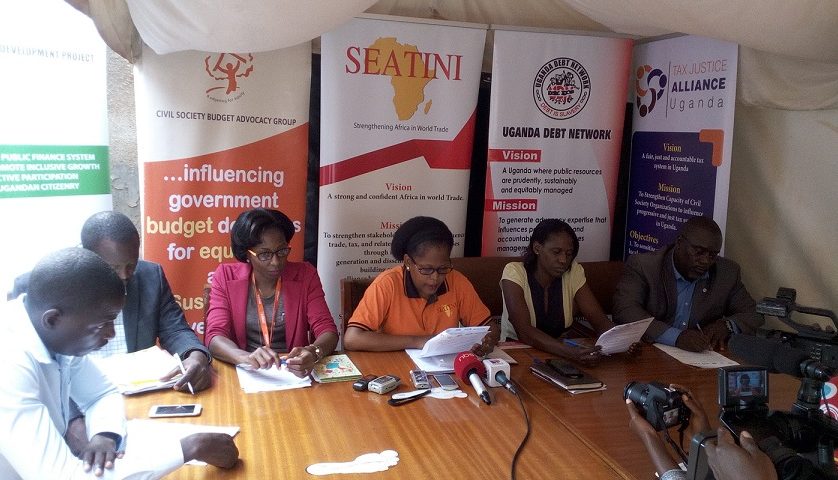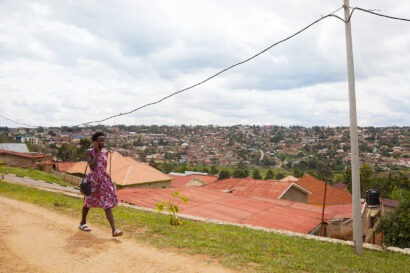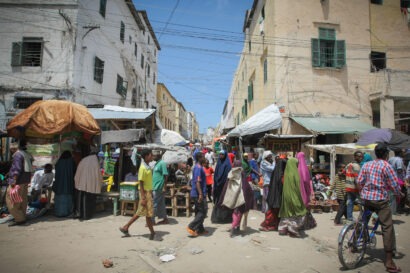In this blog, the ICTD speaks with Jane Nalunga, Executive Director of SEATINI Uganda to learn about the organisation’s quest for tax justice and how it has enhanced the voices of citizens to demand accountability and effectively participate in fiscal policies.
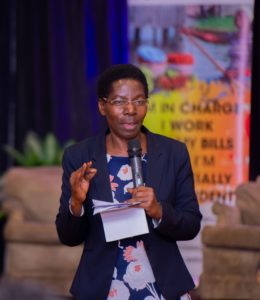
Can you provide us with a brief background of your organisation’s work?
Nalunga: For over 10 years now, SEATINI Uganda has focused on promoting fair and inclusive fiscal policies and strategies for revenue mobilisation, allocation, utilisation and accountability for sustainable development.
The discourse on Domestic Revenue Mobilisation (DRM) is critical for low-income countries in Sub-Saharan Africa, including Uganda. DRM not only provides governments with funds needed to invest in development, alleviate poverty and deliver public services, but is also a critical step on the path out of aid dependence to sustainable development financing.
Low-income countries face many challenges in mobilising domestic revenue. These range from the structure and nature of their economies, the policies in place, and the capacity of tax enforcement and collection agencies. External resource flows are either dwindling or have conditions attached, making it imperative to raise resources domestically.
There are a number of groups working on taxation, and many of them aim to ensure that countries have proper tax systems in place. How is SEATINI Uganda’s work different from that of others?
Nalunga: Our work focuses on promoting tax justice – everyone paying their fair of taxes with the emphasis on the social contract between citizens and the state. Tax justice refers to ideas, policies and advocacy that seek to achieve equality and social justice through fair taxes on wealthier members of society and multinational corporations. It focuses on tackling tax leakages, tax havens and curtailing corruption and tax abuse by multinationals and making them pay their fair share.
To this effect, SEATINI Uganda strives to promote tax as a tool to finance Uganda’s sustainable development aspirations.We regularly contribute to domestic tax debates and advocate for socially just, accountable and progressive taxation in Uganda and beyond. Our organisation promotes the obligation of citizens to pay their taxes as well as their fundamental right to demand accountability from the government.
Through demystifying taxation, we promote the 4Rs of taxation (i.e. Revenue, Re-pricing, Redistribution and Representation) for citizens and also explain the link between taxation and development. We have also strengthened the capacity of stakeholders for effective engagement with duty bearers and amplified their voices to influence fair, progressive, prudent, and gender responsive revenue mobilisation, allocation and accountability policies and practices at sub national, national, regional and international levels.
SEATINI Uganda has seen a number of successes in advancing the tax justice agenda. What strategies has the organisation used to achieve these?
Nalunga: SEATINI Uganda has proactively raised awareness among citizens to understand and appreciate their rights and obligations as taxpayers so they are able to demand accountability from duty bearers.
We have done this through building alliances and mobilising CSOs and citizens for engagement with policy makers and technocrats at all levels as one of the strategies to amplify voices on different processes like double taxation agreements and Uganda’s DRM strategy among others. For instance, we currently host and coordinate the Tax Justice Alliance Uganda, a loose coalition of like-minded organisations working to promote and improve civil society and citizen participation in revenue mobilisation and accountability processes. With these partners, we have mobilised citizens to engage in various campaigns, including the Mobile Money Tax campaign.
We also work closely with like-minded organisations to focus on other key issues such as gender, environment, trade, human rights, and climate change. Through these alliances, CSOs can leverage each other’s strengths to better understand the issues and rally various stakeholders to join the tax justice movement. Collectively, we work towards advocating for progressive, equitable and accountable tax policies and systems to generate sufficient revenue while ensuring revenue is fairly redistributed to achieve development at all levels.
SEATINI Uganda conducts research to identify the main bottlenecks (regressive tax system, award of arbitrary tax exemptions and incentives, adoption of harmful Double Taxation Agreements, etc.) within tax systems and provides alternative policy proposals for domestic revenue mobilisation and allocation and utilisation at all levels.
We also regularly tailor and disseminate information for different categories of citizens through information, education and communication materials, policy briefs, research studies, and short videos. We also use radio, television, print media and social media to put issues in the public domain. Through the use of these media channels, we have been able to raise awareness and gather citizens’ opinions on tax policies, which we then share with duty bearers. Following Covid-19 and other containment measures, we have increasingly focused on digital outreach, which has increased engagement with relevant stakeholders, especially the youth.
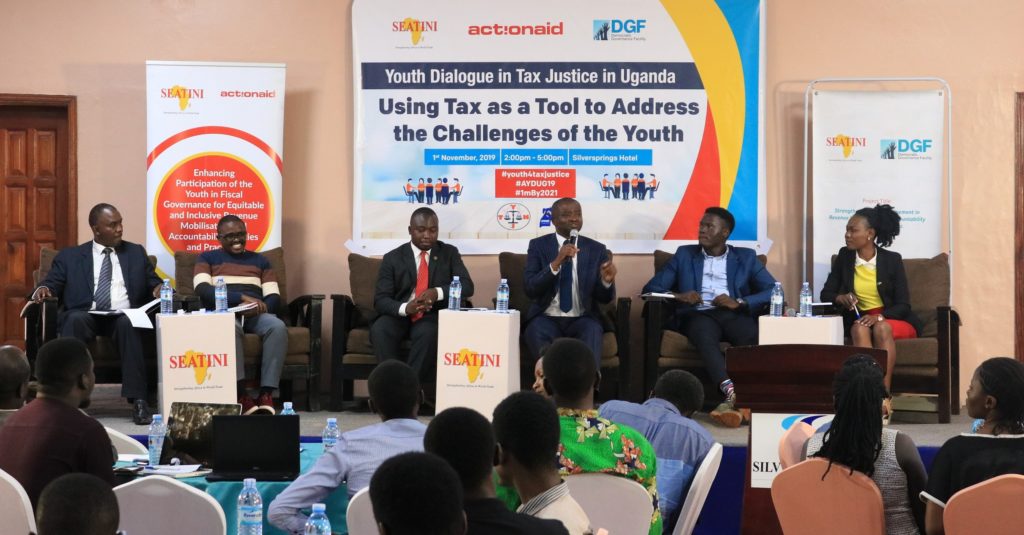
What are the main challenges that have hindered achievement of the tax justice agenda despite your efforts?
Nalunga: Citizens in Uganda still have a limited capacity to effectively challenge unfair and inequitable economic policies and generate viable alternatives that promote inclusive and sustainable development. This is because citizens have not fully appreciated the nexus between revenue mobilisation/taxation and service delivery and democratic governance. As a result, the majority of citizens do not see themselves as tax payers and therefore have not effectively exercised their right to demand accountability or participate in tax debates.
Before the abolishment of graduated tax in 2005, most people thought that they were not paying taxes anymore and government was merely doing them a favour by providing services not knowing that they paid taxes indirectly on consumables. The over-reliance on consumption taxes like VAT and excise duties has greatly burdened citizens, especially the most vulnerable who have to purchase basic commodities like salt, kerosene, and water for domestic use.
The negative political will towards establishing policies that promote fair and equitable revenue mobilisation policies and practices is also a major hindrance. For example, policy makers have previously enacted policies in favour of affluent officials such as the provision of numerous tax incentives and exemptions for multinational companies and exemptions for Members of Parliament’s emoluments.
There are also still limited spaces for stakeholder engagement as some processes are kept closed in and are a preserve for key officials within the Ministry of Finance, Planning and Economic Development (MoFPED) and the Uganda Revenue Authority (URA).
The above challenges have been exacerbated by the limited human and financial resources for CSOs to ensure sustained and effective engagement on tax justice issues at the sub-national and national levels.
Which strategies have been most useful towards achieving your successes?
Nalunga: We have worked and strengthened our networks and alliances at the national, regional and global levels with the Tax Justice Alliance Uganda (TJA-U), East African Tax and Governance Network (EATGN), Tax Justice Network Africa (TJN-A), and Global Alliance for Tax Justice (GATJ).
Through these alliances and networks, citizens have been able to successfully campaign against regressive taxes such as the Over The Top (OTT) tax, taxes on mobile money and most recently the proposed taxation of cash withdrawals from banks. Through Tax Justice Alliance Uganda, we have successfully mobilised citizens to participate in tax debates and champion campaigns against unfair taxes by engaging their Members of Parliament to push for desired reforms.
We have also conducted training for various stakeholders to help them understand and appreciate the link between tax and development and enable them to engage effectively with government.
Targeted engagements such as meetings and workshops with policy makers have enabled SEATINI Uganda to shape tax policies in Uganda and beyond to influence key policy processes such as double taxation agreements, domestic revenue mobilisation strategies, annual tax bills, tax incentives and exemptions, East African Community tax harmonisation, and the BEPS process on multinational taxation at the global level.
What are some of the foreseen opportunities which you believe will allow you to push your work ahead?
Nalunga: At the moment, DRM is the “elephant in the room” given the imperative for governments to provide social services such as health and to revive the economy in the midst of the Covid-19 pandemic.
The government of Uganda is currently providing spaces for effective engagement with civil society and SEATINI Uganda continues to have constructive engagement with relevant government ministries, departments and agencies towards shaping fair and equitable tax systems.
SEATINI Uganda has a Memorandum of Understanding with the URA to allow for joint research and capacity building, as well as awareness raising initiatives within the country. We also represent the Tax Justice Alliance Uganda on the DRM committee at the MoFPED, which is expected to ensure effective implementation of the national DRM strategy.
This provides SEATINI Uganda with the opportunity to regularly share CSO proposals and keenly follow up on their adoption through engagement in these spaces.
Learn more about SEATINI Uganda’s work here.
